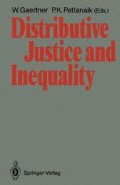Abstract
The Lorenz curve of income after tax is known to dominate the one before tax for all given pre-tax income distributions, if, and only if, average tax liability is increasing with income (Jakobsson 1976; Eichhorn et al. 1984). It is shown in this note that the absolute inequality of incomes (Kolm 1976) is unambiguously reduced by taxation if, and only if, tax liability is increasing with income.
It is a pleasure to acknowledge the intellectual debt I owe to W. Eichhorn, H. Funke, and W. F. Richter whose result on progressive taxation and income inequality stimulated the present research. I am grateful to an anonymous referee whose comments on an earlier draft improved the paper.
Access this chapter
Tax calculation will be finalised at checkout
Purchases are for personal use only
Preview
Unable to display preview. Download preview PDF.
References
Blum WJ, Kalven HK (1953) The uneasy case for progressive taxation. University of Chicago Press, Chicago
Eichhorn W, Funke H, Richter WF (1984) Tax progression and inequality of income distribution. J Math Econ 13:127–131
Fei JCH (1981) Equity oriented fiscal programs. Econometrica 49:869–881
Fields GS, Fei JCH (1978) On inequality comparisons. Econometrica 46:303–316
Foster JE (1985) Inequality measurement. In: Young HP (ed) Fair allocations, vol 33, American Mathematical Society Proceedings of Symposia in Applied Mathematics. Providence, Rhode Island
Jakobsson U (1976) On the measurement of the degree of progression. J Publ Econ 5:161–168
Kakwani NC (1977) Applications of Lorenz curves in economic analysis. Econometrica 45:719–727
Kolm S-C (1976) Unequal inequalities I. J Econ Theory 12:416–442
Marshall AW, Olkin I (1979) Inequalities: Theory of majorization and its applications. Academic Press, New-York
Moyes P (1987) A new concept of Lorenz domination. Econ Letters 23:203–207
Musgrave RA, Thin T (1948) Income tax progression: 1929–48. J Polit Econ 56:498–514
Rothschild M, Stiglitz J (1973) Some further results in the measurement of inequality. J Econ Theory 6:188–204
Shorrocks AF (1983) Ranking income distributions. Económica 50:3–17
Author information
Authors and Affiliations
Editor information
Editors and Affiliations
Rights and permissions
Copyright information
© 1988 Springer-Verlag Berlin Heidelberg
About this paper
Cite this paper
Moyes, P. (1988). A Note on Minimally Progressive Taxation and Absolute Income Inequality. In: Gaertner, W., Pattanaik, P.K. (eds) Distributive Justice and Inequality. Springer, Berlin, Heidelberg. https://doi.org/10.1007/978-3-642-73816-6_9
Download citation
DOI: https://doi.org/10.1007/978-3-642-73816-6_9
Publisher Name: Springer, Berlin, Heidelberg
Print ISBN: 978-3-642-73818-0
Online ISBN: 978-3-642-73816-6
eBook Packages: Springer Book Archive

